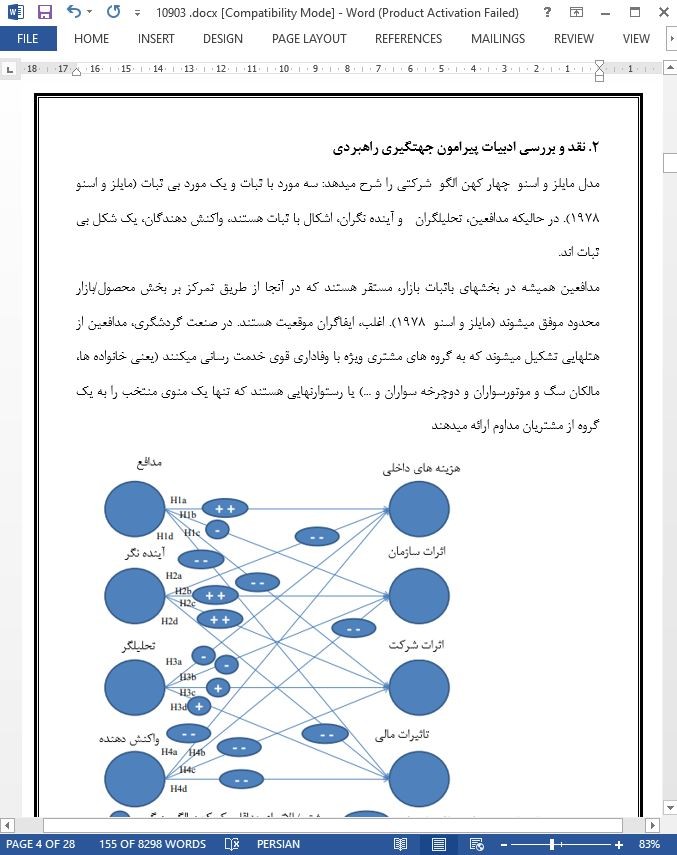
گزینه های راهبردی برای شرکت های توریسم به منظور غلبه بر دوران های بحران
چکیده
این تحقیق موفقیت راهبردهای پیرو سنخ شناسی مایلز و اسنو در طول یک رکود اقتصادی در صنعت توریسم اسپانیا را بررسی میکند. یک زمینه یابی برای یافتن راهبردها و سنجش اثرات متحمل شده از سوی شرکتهای گردشگری در طول بحران مالی گذشته اجرا شد. پیرامون راهبردها، جدای از تحلیلگران ، این نمونه شامل هر سه کهن الگو دیگر میشد. آینده نگران به بهترین شکل برای تحمل یک رکود اقتصادی مهیا شدند، به این صورت مدافعین امتیاز دوم گرفتند. واکنش دهندگان، بدترین ایفا کنندگان بودند. نتیجه گیریها تاکید میکنند برای مالکان/ مدیران شرکتهای گردشگری، انتخاب راهبردی که مناسب موقعیت محیطی باشد، عاقلانه است.
1. .مقدمه
داده های اقتصادی اخیر نشان داده است بحران مالی که به طور جدی اسپانیا هم چنین دیگر کشورهای اروپای جنوبی را تحت تاثیر قرار داده است، به اتمام رسیده است. تخمینها نشان داده اند GDP در سال 2015 بار دیگر افزایش پیدا کرد. گردشگری بدترین سالهای خود را در سالهای 2008/2009 تجربه کرد و ضربه ی دیگری را در سالهای 2013/2012 با بدتر شدن بحران یورو در یونان و اثرات جانبی اش بر سایر کشورهای جنوب اروپا تجربه کرد (INE 2015). گرچه گروه یورو پیرامون بسته های کمکی برای یونان به تفاهم نامه هایی دست یافته اند (کمیسیون یوروپیج پرستل 2015)،اما مشخص نیست آیا این موقعیت ممکن است بار دیگر به خاطر بحرانهای دیگری مثل حملات تروریستی و بحران پناهندگان به عنوان یک پیامد، بدتر شود که انعکاسهایی را برای سایر بخشهای اروپا در پی دارد.
نتیجه گیری ها
نتایج این تحقیق، شماری از نتیجه گیری های مقتضی برای شیوه مدیریتی و دانشگاهی را ارائه میدهد. با فرض اینکه محیطهای نامعلوم و مخالف بر راهبردهای تجاری تاثیر دارند، شناسایی رفتارهای تجاری موفق برای غلبه بر زمانهای بحران، مبرم است. اولا، تنها راهبردی که به صورت پیش بینی شده عمل میکند، راهبرد واکنش دهنده است. لذا، این نوع راهبرد برای تطبیق هر روندی در محیط زیست با شکست مواجه شد و از همه ی موارد دیگر بر حسب رشد، بلوغ یا موقعیتهای رکود اقتصادی بدتر عمل کرد (آلونسو- آلمیدا و برمسر 2013؛ آلونسو- آلمیدا و دیگران 2015الف؛ گاریگوز-سیمون و دیگران 2005؛کوزوقلو و دیگران 2013). لذا این تحقیق نیاز برای شرکتهای توریستی به منظور توسعه یک راهبرد کاملا بررسی شده به طور سنجیده را تایید مینماید. لذا، مدیران باید راهبردها، شایستگی ها و قابلیتهای بارز برای حفظ و بهبود رقابتی بودن را گسترش دهند (آلونسو- آلمیدا و دیگران 2015الف؛ نیووی و زهرا 2009).
Abstract
This research investigates the success of strategies following the Miles and Snow typology during an economic downturn in the Spanish tourism industry. A survey was conducted to find strategies and measure the impacts suffered by tourism companies during the last financial crisis. Regarding strategies, apart from analyzers, the sample included all three other archetypes. Prospectors were the best prepared to withstand an economic downturn, with defenders scoring second. Reactors were the worst performers. The conclusions highlight that it is wise for owners/managers of tourism companies to select a strategy that suits the environmental situation.
1 Introduction
Recent economic data have shown that the financial crisis that affected Spain severely, as well as other Southern European countries, has come to an end. Estimates have shown that GDP in 2015 increased again (INE 2015). Tourism experienced its worst years in 2008/2009 and suffered another blow in 2012/2013 with the worsening of the Euro Crisis in Greece and its side effects on other Southern European countries (INE 2015). Although the Euro Group has reached agreements on bailout packages for Greece (Europa¨ische Kommission Pressestelle 2015), it is not known whether the situation might worsen again due to other crises, such as terrorist attacks and the refugee crisis and, as a consequence, have repercussions for other parts of Europe.
6 Conclusions
The results of this research provide a number of pertinent conclusions for managerial practice and academia. Given that uncertain and hostile environments influence business strategies, it is urgent to identify successful business behaviors to overcome times of crisis. First, the only strategy that behaved as predicted was the reactor strategy. Thus, this type of strategy failed to adapt to any trend in the environment and performed worse than the others in terms of growth, mature, or downturn situations (AlonsoAlmeida and Bremser 2013; Alonso-Almeida et al. 2015a; Garrigo´s-Simo´n et al. 2005; Ko¨seoglu et al. 2013). Therefore, this research confirms the need for tourist companies to deploy a thoroughly considered strategy deliberately. Thus, managers should develop distinctive strategies, competences, and capabilities to maintain or improve competitiveness (Alonso-Almeida et al. 2015a; Newey and Zahra 2009).

چکیده
1. .مقدمه
2. نقد و بررسی ادبیات پیرامون جهتگیری راهبردی
3 روش شناسی
3.1 نمونه و روش
3.2 اندازه گیری ها
4 نتایج
4.1 ارزیابی مدل اندازه گیری
4.2 ارزیابی مدل ساختاری
5. بحث نتایج
6.نتیجه گیری ها
Abstract
1 Introduction
2 Review of the literature regarding strategic orientation
3 Methodology
3.1 Sample and method
3.2 Measurements
4 Results
4.1 Assessment of the measurement model
4.2 Assessment of the structural model
5 Discussion of results
6 Conclusions
- اصل مقاله انگلیسی با فرمت ورد (word) با قابلیت ویرایش
- ترجمه فارسی مقاله با فرمت ورد (word) با قابلیت ویرایش، بدون آرم سایت ای ترجمه
- ترجمه فارسی مقاله با فرمت pdf، بدون آرم سایت ای ترجمه
